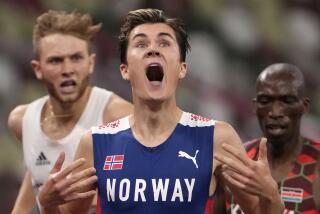IOC rebukes Pound for remarks on Armstrong
The International Olympic Committee on Friday rebuked Dick Pound, head of the World Anti-Doping Agency, for comments it said had impugned the integrity of cycling star Lance Armstrong.
The action resulted from a complaint Armstrong filed in 2005 with the IOC Ethics Commission after Pound publicly suggested that the cyclist had taken the blood-doping hormone erythropoietin, or EPO, during the 1999 Tour de France. Armstrong’s victory that year was the first of his record seven consecutive Tour championships.
The statements by Pound, who has been widely criticized for prematurely or inaccurately condemning athletes subject to international drug testing, ignited a public clash between him and Armstrong.
Pound and officials of his Montreal-based organization, known as WADA, could not be reached late Friday for comment.
The IOC endorsed the ethics commission’s carefully worded finding that Pound’s public remarks “could have been regarded as likely to impugn the probity” of Armstrong. The remarks, it added, were imprudent in light of the Olympic charter’s goal of “a spirit of friendship, solidarity, and fair play” within the movement.
The ethics body had recommended on Feb. 2 that the IOC executive board “remind [Pound] of the obligation to exercise greater prudence
Armstrong’s complaint had named Pound and WADA, but the ethics commission found that, as an independent agency, WADA lay outside its jurisdiction. In addition to his role as WADA president, however, Pound is a member of the IOC, which made him subject to its oversight. The ethics commission said that it found no “incriminating element” in Pound’s conduct, but noted that he had refused to respond to its requests that he respond to Armstrong’s complaint.
“In the world of the IOC, this is a censure,” said Mark S. Levinstein, a Washington attorney who helped Armstrong bring the complaint. “It’s a clear statement that Pound violated the Olympic charter, the rules of the IOC, and the rules of the Olympic movement.”
*
More to Read
Go beyond the scoreboard
Get the latest on L.A.'s teams in the daily Sports Report newsletter.
You may occasionally receive promotional content from the Los Angeles Times.




